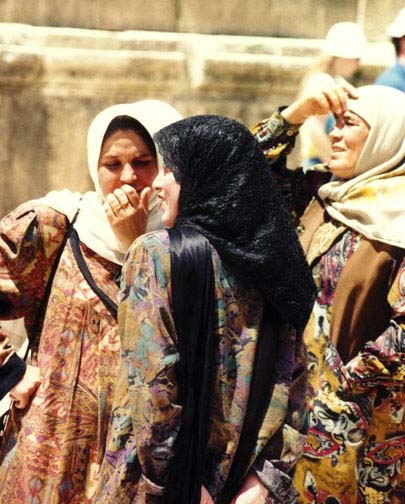
Peace Corps Edges Into Arab World
Peace Corps Edges Into Arab World
Scott Peterson
Staff writer of The Christian Science Monitor
IRAQ AL-AMIR, JORDAN
Before the Peace Corps came to Jordan, Dina Salman al-Abadi's image of Americans had been gleaned from US television and movies.
That view began to change when Peace Corps volunteer Joshua Emmott arrived in this small village on the edge of the Jordan River Valley.
"From when I was little, I had the perception that Americans were extremely violent - that they all shot people," she recalls with a laugh. "But he was polite, said 'Good morning, how are you?' And I saw he wasn't carrying a gun."
Now, after more than a year - Peace Corps volunteers first arrived in Jordan in May 1997 - Mr. Emmott is accepted here "like we are all brothers and sisters," Ms. Abadi says. "Now I would love to go to America."
Strategic Jordan is unique in the region for its relatively warm relations with Israel and the degree to which it looks to the West.
It is also the first Mideast nation to welcome the Peace Corps, in part because of the special place the organization holds in the heart of Queen Noor, the American-born wife of King Hussein.
"I ... grew up in Washington during President Kennedy's administration," she told CNN's Larry King recently. "[I] was convinced that perhaps the greatest career ... would be to be in the Peace Corps."
FITTING IN: American Peace Corps volunteer Joshua Emmott teaches a pottery class in a Jordanian village.
(SCOTT PETERSON)
Queen Noor joined Hillary Rodham Clinton last week to inaugurate the new Peace Corps building in Washington. Voicing her appreciation for workers in Jordan, she quoted the Muslim Prophet Muhammad, who said "the best of men are those who are useful to others."
Current tensions in the Mideast - over the collapse of the Arab-Israeli peace process, Iraq's confrontation with the United Nations, and a general disillusionment with US policies - have fueled a need for the Peace Corps to build cultural ties.
Jordan signed a peace deal with Israel in 1994 when the momentum for peace was regionwide. US-Jordan ties have blossomed as a result, but what Arabs view as Israeli intransigence on troop withdrawal from the West Bank, as well as continued Jewish settlement, has made the "peace camp" small indeed.
"Lessons from our region show that peace must be built between peoples," the queen said in Washington.
Both the program and host organizations are still learning from each other.
"There was a big question: Can an American live in this [conservative] environment?" says Lawrence Bartlett, the Peace Corps country director for Jordan.
Of the first 27 volunteers who arrived, eight left because the change was too much, or they did not find satisfaction in their jobs. Others have adapted well.
"It was as different as could ever have been imagined," says Emmott, who had living and travel experience in Egypt and Turkey already.
Changes often included squat toilets and sleeping on the roof. Privacy disappeared, as volunteers spent the first three months living with families and undergoing intense Arabic-language training.
There were more changes after moving to villages, where volunteers work on small income-generating or conservation projects, or with youths. Next month, education projects and English teaching will be added to the list.
'Finally he said: 'I don't like [American policy]. But I like you.' "
- Joshua Emmott, Peace Corps volunteer
Integration takes time and cultural sensitivity. Anne Austin, for example, had lived in Saudi Arabia - where women must be covered from head to toe in in public. Jordan is much less strict, and Ms. Austin was warmly welcomed by her host family.
But she still had to work to win the respect of the 20 boys at the Mamunieh juvenile center, 20 miles south of Amman, where she used her training as a volunteer counselor at the Atlanta Probation Center.
"Dealing with the boys depends on your personality, and sometimes you have to act like a man with them, and sometimes like a big sister," says Luna Ajilat, a sociologist at the center.
"They saw me more as an American than as a woman, which helped me 'be one of the boys' more easily," Austin says.
The boys - all but five have moved on - enjoy the woodworking shop and learning the alphabet. But there are few resources; even crayons are at a premium.
"Most of us came here thinking, 'We are going to make big changes,' " she says. "But you must take baby steps."
Emmott's job has been to revamp the ceramics portion of a project backed by the queen's Noor Al-Hussein Foundation. He works with unmarried women, so before he began, parents were "spoken to" about his Peace Corps mission. Now they joke with each other in Arabic.
Tensions for the volunteers can mirror those in the Mideast, however. During the Iraq crisis in February, when US forces were on the verge of bombing Iraq, riots broke out in parts of Jordan. Though volunteers were sometimes nervous, "their protection comes from how they live and where they live," says Mr. Bartlett. "They are integrated and close to families."
In Emmott's village, an Iraqi gardener at one point told the volunteer he wanted to go home "to fight the Americans."
"At first he avoided me but I kept offering tea," Emmott remembers. "Finally he said: 'I don't like [the policy of] America. But I like you.' "
Before bookmarking this page in your browser, click here.
The URL for this page is:
http://www.csmonitor.com/durable/1998/09/25/fp1s4-csm.shtml
For further information:
* Jordan,
* Remarks of Her Majesty Queen Noor Dedication of Peace Corps Headquarters,
* Peace Corps
